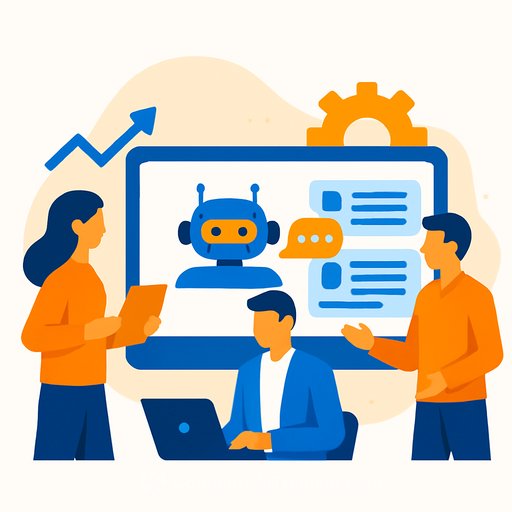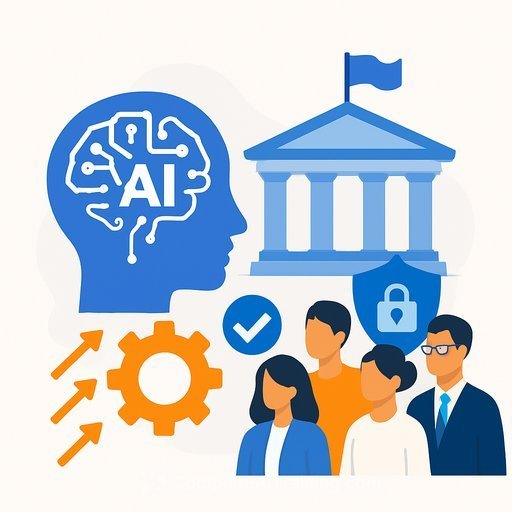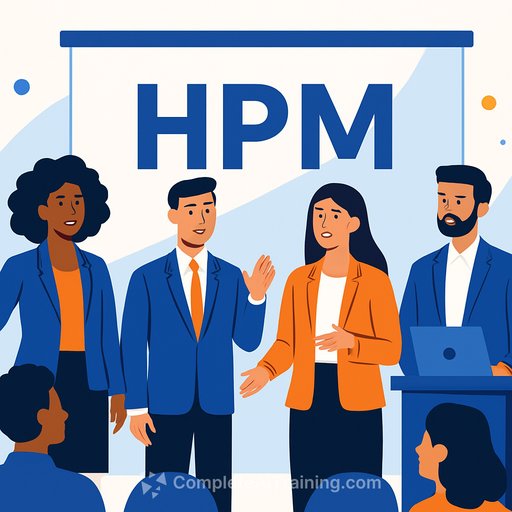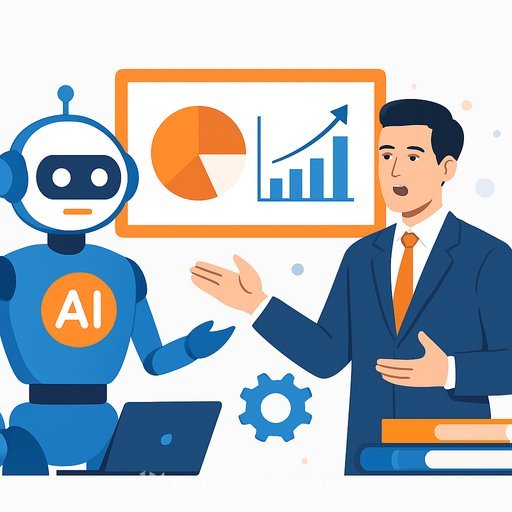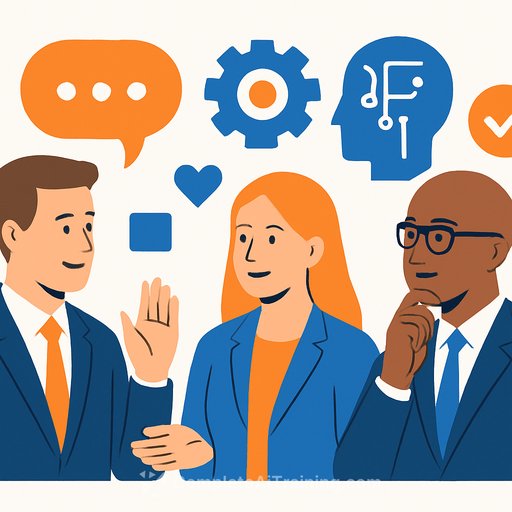Agentic HR: What Workday's AI Shift Means for Your Team
AI helps humans. That's the point. The real move in HR isn't replacing people-it's offloading repetitive tasks so your team can focus on judgment, coaching, and outcomes. Workday's latest agentic AI push makes that clear-and it raises a practical question for HR leaders: how do we keep skills sharp while the machines get faster?
Is AI Quietly Killing Human Skills?
There's a trade-off. Calculators dull mental math; Maps dull direction sense. Heather Stefanski (McKinsey) put it plainly: "We teach people how to teach and we teach people how to learn." Chris Ernst (Workday) argues for doubling down on the human side-empathy, judgment, and coaching-because that's what remains when automation is everywhere.
The takeaway for HR: don't just deploy AI. Pair it with deliberate learning design, on-the-job feedback loops, and performance systems that reward problem-solving, not just output volume.
How Agentic Has HR Become?
Workday's agentic services now draft and summarize performance reviews, execute financial close actions, and run cost and profitability analysis. HR agents gauge employee sentiment, generate statements of work for contingent talent, draft contracts, and push tasks through to payroll.
Jerry Ting (Workday, via the Evisort acquisition) and Peter Bailis highlighted the operational layer: agents that act, not just predict. This shift moves HR from dashboards to done work-if governance and oversight are in place.
Workday's Platform Bet: Agents, Context, and an Open Approach
"AI is under-hyped today," said Aneel Bhusri (Workday). His key point: firms must manage employees, contractors, freelancers-and now software agents. Agents "don't get sick, but they don't listen very well," which is why Workday is building an agent system of record to track who (or what) did what, when, and why.
Backed by one trillion transactions per year, Workday positions its platform as a system of action: not just records or transactions, but execution-workflows and tasks that move end-to-end with business context.
A Practical Manifesto for Enterprise AI
- Amplify talent potential
- Improve decision quality
- Strengthen compliance
- Boost productivity
- Deliver measurable ROI
Gerrit Kazmaier (Workday) called out the hard parts: data readiness, governance, and fragmentation from point tools-worse on closed platforms. Workday's answer: an open platform and workflow-driven agents that bring ERP-grade context to AI execution.
The CEO View: From Apps to a Platform
Carl Eschenbach (Workday) said the company now plays both as an application suite (HCM and financials) and a platform that supports third-party innovation. The aperture is opening: consolidate point tools, build on top, and keep the ecosystem flexible.
On going wider than ERP-adjacent workflows, Workday points to selective moves (healthcare supply chain, higher ed student platform) but stays focused on platform-first growth rather than a broad roll-up strategy.
Market Context: Where Workday Competes
Peers include SAP SuccessFactors and Oracle Fusion Cloud HCM at the suite level. Dayforce ranks high across payroll, benefits, and workforce management. Other notable players: UKG, ADP (Workforce Now), Paycom, Paylocity, and BambooHR (SME-focused, HRIS-led). Analyst coverage also notes Info, Cornerstone, Darwinbox, Yonyou, and Cegrid.
Tiffani Bova (The Futurum Group) says Workday is leaning into a partner ecosystem that extends beyond traditional HR-AI analytics, healthcare, and financial apps-positioning it as a platform company, not just an HCM suite.
What HR Leaders Should Do Next
- Map work to agents: Identify tasks ripe for automation (reviews drafting, pay changes, job postings, reconciliations). Define human-in-the-loop steps.
- Protect core skills: Pair AI usage with learning sprints in problem-solving, coaching, and ethical judgment.
- Stand up governance: Create an AI use policy, approval process, RACI for agents, and audit trails. Use a central catalog for agent capabilities.
- Measure what matters: Cycle time, error rates, compliance exceptions, employee sentiment, and learning adoption-not just time saved.
- Pilot, then scale: Start with low-risk workflows (e.g., internal mobility suggestions, job description generation), then move to payroll-adjacent tasks with stronger controls.
- Upskill the team: Train HRBPs and COEs on prompt quality, exception handling, and interpreting model outputs-not just tool clicks.
- Data first: Clean job architectures, skills taxonomies, and org data. Bad data guarantees bad agents.
Buying Checklist for Agentic HR Platforms
- Global readiness: Localization depth for payroll, time, and compliance.
- Configuration over customization: Low-code workflows, versioning, and rollback.
- Security and governance: Access controls, policy management, auditability, explainability.
- Openness: APIs, event streams, and an ecosystem that doesn't lock you in.
- Scalability: Proven transaction volume, performance SLAs, and cost transparency.
- Agent controls: Human-in-the-loop options, test sandboxes, and outcome tracking.
- Price-to-value: Tie licensing to measurable outcomes, not feature lists.
Risk, Compliance, and Trust
AI in HR lives under stricter scrutiny-privacy, fairness, and auditability are non-negotiable. Start with a risk framework and document your controls up front. For reference, see the NIST AI Risk Management Framework for structure and terminology.
KPIs to Track From Day One
- Time-to-complete for core HR workflows (offers, transfers, pay changes)
- Payroll accuracy and off-cycle correction rate
- Compliance exceptions and time-to-remediate
- Agent intervention rate (how often humans must correct)
- Employee sentiment on fairness and clarity
- Learning completion tied to new AI-driven processes
The Bottom Line
AI won't make people obsolete. It will make low-value work scarce. The HR teams that win will use agents to execute, while investing in human skills that compound: coaching, decision-making, ethical judgment, and change leadership.
If you're building a skills plan for HR roles in an AI-enabled org, explore role-based learning paths here: Complete AI Training - Courses by Job.
Quote Sheet
- Aneel Bhusri (Workday): "AI is under-hyped today… people know what AI can do and what it can't do… we're on the path to enlightenment."
- On agents: "Those agents are very functional and don't get sick, but they also don't listen very well."
- Gerrit Kazmaier (Workday): "Getting data AI-ready and tackling governance and compliance is tough-disconnected point products make things even more difficult."
- Carl Eschenbach (Workday): "We're one of the few companies that can claim we're both an application company and a platform company."
- Heather Stefanski (McKinsey): "We teach people how to teach and we teach people how to learn."
Your membership also unlocks:

